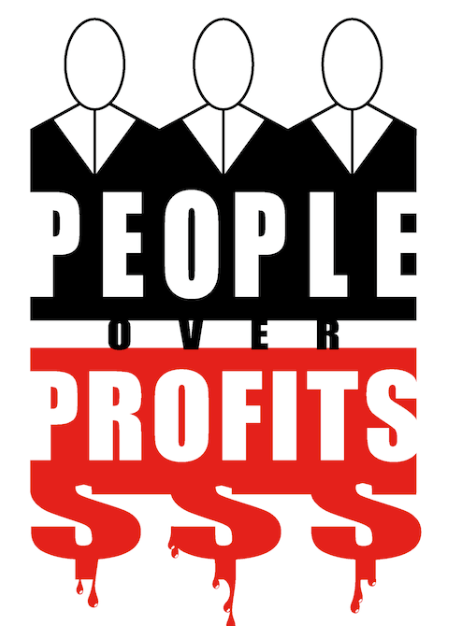Ricochet is the best place on the internet to discuss the issues of the day, either through commenting on posts or writing your own for our active and dynamic community in a fully moderated environment. In addition, the Ricochet Audio Network offers over 50 original podcasts with new episodes released every day.
 Today in False Choices: People Versus Profits
Today in False Choices: People Versus Profits
 Consulting with corporations about the importance of putting “people before profits” is mutually beneficial to both corporation and speaker: the former is afforded cheap virtue and the latter an expensive lifestyle. In the world of speaking and corporate consulting, espousing the People-Before-Profits narrative — as with the virtues authenticity and diversity — is simply good business practice.
Consulting with corporations about the importance of putting “people before profits” is mutually beneficial to both corporation and speaker: the former is afforded cheap virtue and the latter an expensive lifestyle. In the world of speaking and corporate consulting, espousing the People-Before-Profits narrative — as with the virtues authenticity and diversity — is simply good business practice.
This value-for-value model is lost on the very same speakers who take it for granted that profits are suspect. These self-styled experts fail to see that, unlike President Obama’s facile description of the tension between liberty and security, the choice between people and profits is a false one. Yet companies throughout the United States are happy to self-flagellate before speaker after speaker, pretending to temporarily forget what reality will forever remind them: that profits are a darn good measure of the extent to which you have served others.
At the heart of the People-Before-Profits movement is an ambivalence about the dignity and morality of business. In popular culture, this idea is most evident in movies and on television, where businessmen are almost invariably portrayed as either moral bankrupts (Wall Street) or courageous heroes who unveil the moral bankruptcy of business (Michael Clayton).
The Birkenstock set in particular has built an entire cottage industry around apologizing for being in business, from technology entrepreneur Kate Emery, to speaker Dan Pallotta, to the TED talks, where the “ideas worth spreading” overwhelmingly assume that profits are opposed to people.
Into this world of received wisdom enters Rabbi Daniel Lapin’s Thou Shall Prosper: Ten Commandments For Making Money. Lapin’s thesis is that, far from being something to be ashamed of, profits should be seen for what they are: a blessing and a measure of our success at serving our fellows.
Published in Culture



Who are you and where’s funny David?
But really: this sound like a “pay if forward” thing. Ugh.
This fat cat says, “My business makes no profit, no-body gets paid. Come work for me anyway, because corporate responsibility.”
For what shall it profit a man, if he shall gain hefty consulting fees and call it non-profit?
Yes, exactly. People over profits… And if it wasn’t profitable, no business would want to hear about it. It could be called “pandering to nonsensical emotions, which will gain you business.”
The irony is pretty delicious.
Company: “We don’t put profits over people!”
Birkenstock set: “You’re not evil, I’ll buy from you!”
Company:
*This is not to stereotype business owners as heartless billionaires who feed their hapless employees to
dogsthe hounds.Absolutely. Profits are pro-people not only for providing products and services desired, but also for investors and those employed or soon-to-be-employed by a profitable company.
It might be an exaggeration, but the biggest loss we have ever suffered is that the leftists have won the language war. As long as “profit” is code for exploitation and the 1%, there is almost no chance to advance capitalism and freedom.
Thanks, David, for trying to re-claim the language.
Our company just hired a Chief People Officer, because it is all about the people. Just another HR guy really, but the wording struck me as funny.
There are two kinds of profit, gross and net. The first is were employees get paid. The second is how the shareholders get paid. Neither should expected to be involved for free.
The speakers at these kinds of events should be limited to people who really used to work at a company that actually put people ahead of profits. Before the company went bankrupt, laid off all of its employees, stiffed its creditors, and left its customers in the lurch. I think that speaker might have something to say that is worth hearing.
I hear a lot of commercials for businesses and (surprisingly) universities now that make the term “not-for-profit” a mantra. They utter it like PBUH at the mention of Mohammad, and I imagine they make the sign against evil every time they must speak the word profit in their radio advertisements.
To quote Kevin Williamson from one of his best articles:
In fact, it’s about time for my quarterly reading of it.
Mr. Deeble, it’s good to hear from you even when you haven’t prepared a set. Yeah, this kind of consulting is another form of self-help: The people selling & the people buying are learning different things: The sellers, however, are capitalists, no? They’re providing a service on an agreed-upon basis. Pandering is capitalism, too, isn’t it?
Possibly, some forms of capitalism are anti-capitalist…
By the way, what the sellers have learned is that people are losers & want to be reassured & will pay for it. Self-helpers are economists: They get what’s good, if by lying to people about how to get what’s good-
Yep…
Years ago, 60 Minutes did a slobbering piece on some textile mill in New England. It specialized in making Polar Fleece. Anyway, the benevolent owner, like a saint, put people first. He paid high wages and didn’t layoff anyone. Well, about year later the whole plant closed. Lesson learned.